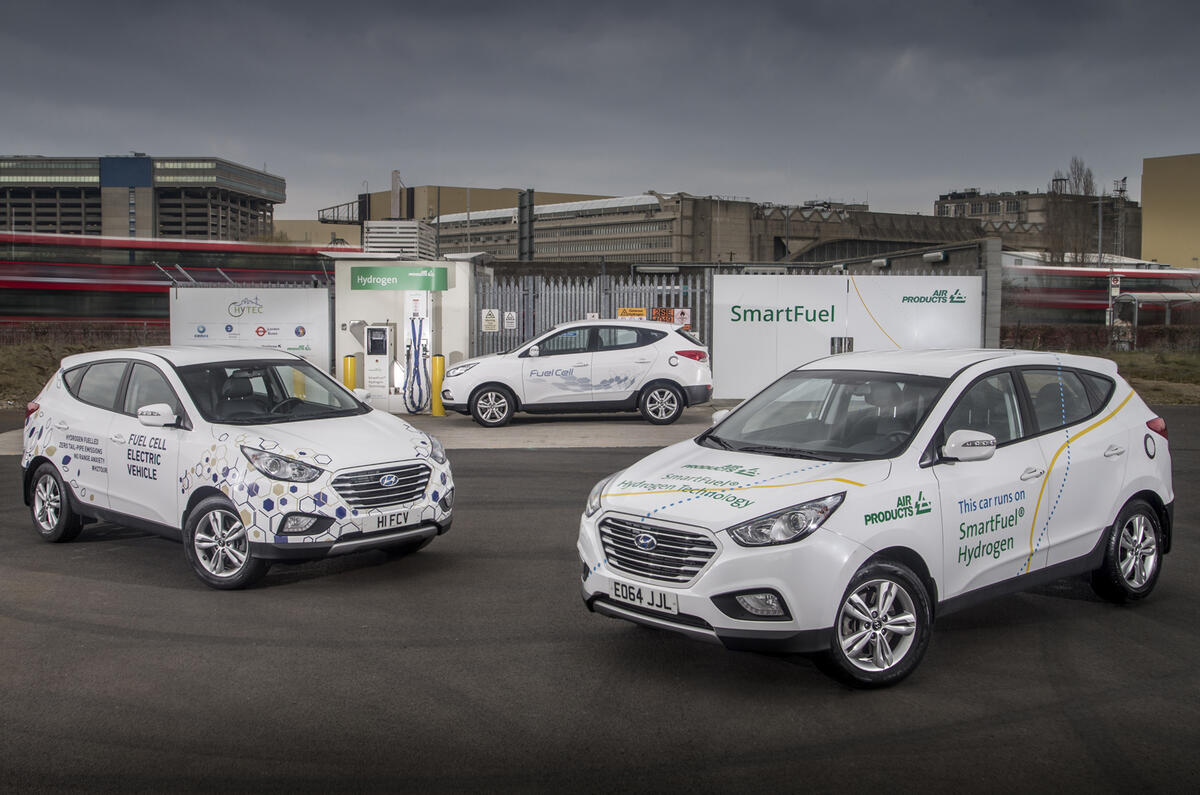The design and body of Hyundai's second-gen hydrogen fuel-cell powered SUV available to the public has been confirmed, and the model will arrive by the end of the decade, replacing the current Hyundai ix35 Fuel Cell.
With a production run of 10-15,000 units needed to be commercially viable over its four-year production run - but no official production number confirmed - "as many as possible" of the as-yet unnamed ix35 Fuel Cell successor will make it to the UK, according to Hyundai product PR manager Robin Hayles. Production numbers, however, are strictly dependent on demand, therefore scalable production will be used.
There are currently 250 Hyundai ix35 Fuel Cell cars on European roads, including 15 in the UK. A large number of these are owned by companies with a vested interest in hydrogen fuel cell vehicle technology. The next car will be targeted more towards the public, with a much smaller percentage of sales expected to be from non-private buyers. This suggests a lower price than the £53,105 of the ix35 Fuel Cell, which will be achieved by using a higher proportion of Hyundai parts, rather than those sourced from specialist manufacturers.
Scalable production methods mean that the number quoted for production could grow considerably, depending on demand. The model is also expected to be an SUV similar in size to the ix35, but it will focus on weight reduction over the current car rather than further honing of the powertrain technology.
The ix35's replacement will be the sixth generation of hydrogen fuel cell vehicle that Hyundai has tested, but only the second generation to be commercially available. The replacement for the ix35 will make up part of the Hyundai Group's planned hydrogen fuel cell vehicle offensive.
The design and body have already been signed off, and although specifications of the car are a closely guarded secret, Hayles revealed that demand from customers for more options and choice on the £53,105 ix35 Fuel Cell has driven Hyundai to offer the ix35 in blue and red in addition to the standard white. Despite the initial production of left-hand drive models, the ix35 Fuel Cell's replacement is likely to also be offered in right-hand drive format, but again, this is not a dead-cert.
Hyundai aims for hydrogen success
The success of the 2017 model in the UK is to be determined by customer demand, which Hyundai hopes will be drummed up by events that will raise public awareness of hydrogen fuel cell vehicles. In spite of recent publicity surrounding the variety of powertrains offered with the new Hyundai Ioniq, the new fuel cell-powered car will not carry the Ioniq badge and is being developed as a standalone vehicle.
Despite Hyundai's involvement with hydrogen fuel cell-powered vehicles, the firm has ruled out any investment in the hydrogen refuelling infrastructure the near future. However, Hayles confirmed that infrastructure is one of the contributory factors to fuel cell vehicles' limited success when compared with their battery EV counterparts.




Join the debate
Add your comment
Buses
xxxx wrote: Why have a
I had no idea there were so many buses, from TFL "We currently have 1,500 diesel-electric hybrid buses running through the Capital and expect the number to increase to 1,700 by 2016, when they'll make up 20% of our bus fleet. " Only 20%!. I also read they were actually trialling Hydrogen buses. An all electric bus is going to need a huge battery to run all day and to power on-board heating for many months of the year, charging all those each night will take huge electrical infrastructures, the wireless charging is merely a light top up. The battery weigh must be huge too. To me it seems simpler to do a 2 minute fill of hydrogen and run all day with as much power as you want, totally cleanly.
The Apprentice wrote: xxxx
Nope, As of 2014 for 5 years there are 8 buses that are capable of running 17 hour days, continuously, dues to wireless charging. It's all on the ARUP website
The Apprentice wrote: An all
Hydrogen isn't the clean or grid-saving option, the electricity it takes to process it into a workable fuel would take a pure electric vehicle at least twice as far.
Electric buses are out there and work fine in cities, where range requirements are lower. As with cars, battery pack energy density is regularly improving, so over time (and certainly by the time H2 power becomes remotely feasible) the range deficit will shrink, so hopefully they'll become the norm.
Make more sense as a commercial vehicle
Make more sense as a commercial vehicle
I think you have the best
Range